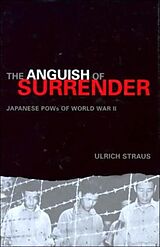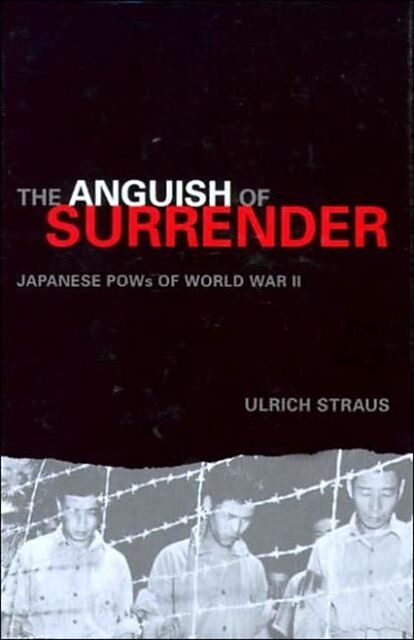The Anguish of Surrender
Einband:
Kartonierter Einband
EAN:
9780295985084
Untertitel:
Japanese POWs of World War II
Genre:
Soziologie
Autor:
Ulrich A. Straus
Herausgeber:
University of Washington Press
Anzahl Seiten:
272
Erscheinungsdatum:
01.03.2005
ISBN:
978-0-295-98508-4
Informationen zum Autor Ulrich "Rick" Straus lived a total of twenty-one years in Japan, first as a child between 1933 and 1940 in Tokyo, then as a U.S. Army language officer during the Occupation, when he participated in the trial of Japan's major war criminals. He was Consul General on Okinawa from 1978 to 1982 and retired from the Foreign Service in 1987. Klappentext On December 6, 1941, Ensign Kazuo Sakamaki was one of a handful of men selected to skipper midget subs on a suicide mission to breach Pearl Harbor's defenses. When his equipment malfunctioned, he couldn't find the entrance to the harbor. He hit several reefs, eventually splitting the sub, and swam to shore some miles from Pearl Harbor. In the early dawn of December 8, he was picked up on the beach by two Japanese American MPs on patrol. Sakamaki became Prisoner No. I of the Pacific War. Japan's no-surrender policy did not permit becoming a POW. Sakamaki and his fellow soldiers and sailors had been indoctrinated to choose between victory and a heroic death. While his comrades had perished, he had survived. By avoiding glorious death and becoming a prisoner of war, Sakamaki believed he had brought shame and dishonor on himself, his family, his community, and his nation, in effect relinquishing his citizenship. Sakamaki fell into despair and, like so many Japanese POWs, begged his captors to kill him. Based on the author's interviews with dozens of former Japanese POWs, along with memoirs only recently coming to light, "The Anguish of Surrender tells one of the great unknown stories of World War II. Beginning with an examination of Japan's prewar ultranationalist climate and the harsh code that precluded the possibility of capture, the author investigates the circumstances of surrender and capture of men like Sakamaki and their experiences in POW camps. Many POWs, ill and starving after days wandering in the jungles or hiding out in caves, were astonished at the superior quality of food and medical treatment they received. Contrary to expectations, most Japanese POWs, psychologicallyunprepared to deal with interrogations, provided information to their captors. Trained Allied linguists, especially Japanese Americans, learned how to extract intelligence by treating the POWs humanely. Allied intelligence personnel took advantage of lax Japanese security precau Zusammenfassung Beginning with an examination of Japan's pre-war ultranationalist climate and the harsh code that precluded the possibility of capture! the author investigates the circumstances of surrender and capture of men like Sakamaki and their experiences in POW camps. It is based on his interviews with dozens of former Japanese POWs along with memoirs. Inhaltsverzeichnis Foreword Preface Acknowledgments Introduction 1. Prisoner Number One 2. Japan's Policy on Prisoners of War 3. Indoctrination into the Senjinkun 4. Honorable Death or Shameful Life 5. America's Secret Weapon: The Army and Navy Japanese Language Schools 6. The Interrogations 7. A Few Very Special POWs 8. Uprisings in the Stockades 9. Everyday Life in the Stockades 10. Returning Home Alive 11. Reflections on Japan's Wartime No-Surrender Policy Notes Bibliography Index ...
Autorentext
Ulrich "Rick" Straus lived a total of twenty-one years in Japan, first as a child between 1933 and 1940 in Tokyo, then as a U.S. Army language officer during the Occupation, when he participated in the trial of Japan's major war criminals. He was Consul General on Okinawa from 1978 to 1982 and retired from the Foreign Service in 1987.
Klappentext
On December 6, 1941, Ensign Kazuo Sakamaki was one of a handful of men selected to skipper midget subs on a suicide mission to breach Pearl Harbor's defenses. When his equipment malfunctioned, he couldn't find the entrance to the harbor. He hit several reefs, eventually splitting the sub, and swam to shore some miles from Pearl Harbor. In the early dawn of December 8, he was picked up on the beach by two Japanese American MPs on patrol. Sakamaki became Prisoner No. I of the Pacific War. Japan's no-surrender policy did not permit becoming a POW. Sakamaki and his fellow soldiers and sailors had been indoctrinated to choose between victory and a heroic death. While his comrades had perished, he had survived. By avoiding glorious death and becoming a prisoner of war, Sakamaki believed he had brought shame and dishonor on himself, his family, his community, and his nation, in effect relinquishing his citizenship. Sakamaki fell into despair and, like so many Japanese POWs, begged his captors to kill him. Based on the author's interviews with dozens of former Japanese POWs, along with memoirs only recently coming to light, "The Anguish of Surrender tells one of the great unknown stories of World War II. Beginning with an examination of Japan's prewar ultranationalist climate and the harsh code that precluded the possibility of capture, the author investigates the circumstances of surrender and capture of men like Sakamaki and their experiences in POW camps. Many POWs, ill and starving after days wandering in the jungles or hiding out in caves, were astonished at the superior quality of food and medical treatment they received. Contrary to expectations, most Japanese POWs, psychologicallyunprepared to deal with interrogations, provided information to their captors. Trained Allied linguists, especially Japanese Americans, learned how to extract intelligence by treating the POWs humanely. Allied intelligence personnel took advantage of lax Japanese security precau
Zusammenfassung
Beginning with an examination of Japan's pre-war ultranationalist climate and the harsh code that precluded the possibility of capture, the author investigates the circumstances of surrender and capture of men like Sakamaki and their experiences in POW camps. It is based on his interviews with dozens of former Japanese POWs along with memoirs.
Inhalt
Foreword
Preface
Acknowledgments
Introduction
1. Prisoner Number One
2. Japan's Policy on Prisoners of War
3. Indoctrination into the Senjinkun
4. Honorable Death or Shameful Life
5. America's Secret Weapon: The Army and Navy Japanese Language Schools
6. The Interrogations
7. A Few Very Special POWs
8. Uprisings in the Stockades
9. Everyday Life in the Stockades
10. Returning Home Alive
11. Reflections on Japan's Wartime No-Surrender Policy
Notes
Bibliography
Index

Leider konnten wir für diesen Artikel keine Preise ermitteln ...
billigbuch.ch sucht jetzt für Sie die besten Angebote ...
Die aktuellen Verkaufspreise von 6 Onlineshops werden in Realtime abgefragt.
Sie können das gewünschte Produkt anschliessend direkt beim Anbieter Ihrer Wahl bestellen.
Loading...
Die aktuellen Verkaufspreise von 6 Onlineshops werden in Realtime abgefragt.
Sie können das gewünschte Produkt anschliessend direkt beim Anbieter Ihrer Wahl bestellen.
| # | Onlineshop | Preis CHF | Versand CHF | Total CHF | ||
|---|---|---|---|---|---|---|
| 1 | Seller | 0.00 | 0.00 | 0.00 |
